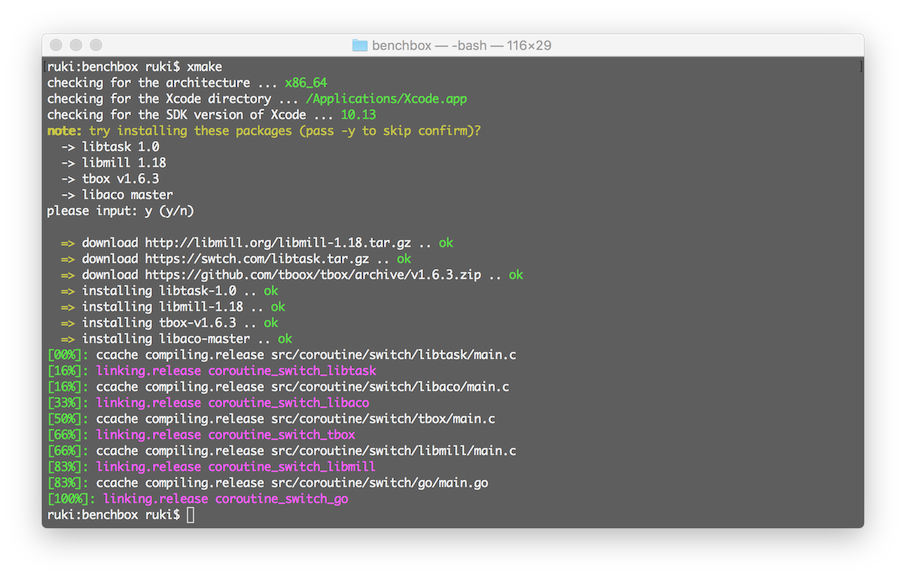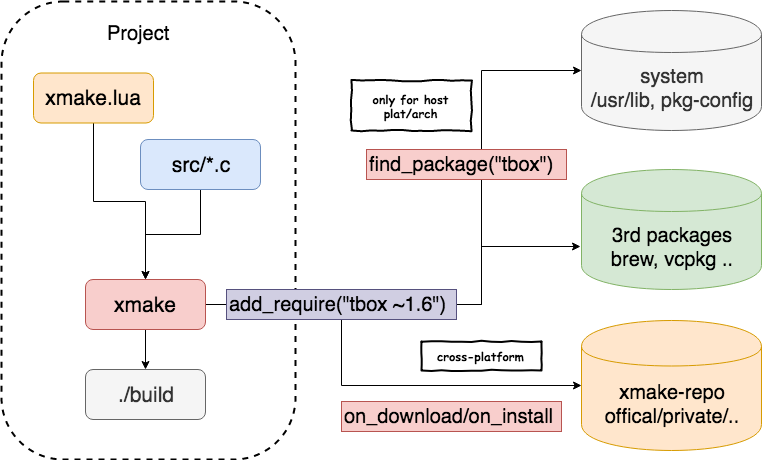Using Official Packages
This has been initially supported after version 2.2.2. The usage is much simpler; just set the corresponding dependency package, for example:
add_requires("tbox 1.6.*", "libpng ~1.16", "zlib")
target("test")
set_kind("binary")
add_files("src/*.c")
add_packages("tbox", "libpng", "zlib")The above add_requires is used to describe the dependencies required by the current project, and add_packages is used to apply dependencies to the test target. Only these settings will automatically add links, linkdirs, includedirs, etc.
Then directly compile:
$ xmakexmake will remotely pull the relevant source package, then automatically compile and install, finally compile the project, and link the dependency package. The specific effect is shown in the following figure:

For more information and progress on package dependency management see the related issues: Remote package management
Currently Supported Features
- Semantic version support, for example: ">= 1.1.0 < 1.2", "~1.6", "1.2.x", "1.*"
- Provide multi-repository management support such as official package repository, self-built private repository, project built-in repository, etc.
- Cross-platform package compilation integration support (packages of different platforms and different architectures can be installed at the same time, fast switching and use)
- Debug dependency package support, source code debugging
Dependency Package Processing Mechanism
Here we briefly introduce the processing mechanism of the entire dependency package:

- Priority check for the current system directory, whether there is a specified package under the third-party package management. If there is a matching package, then you do not need to download and install (of course you can also set the system package)
- Retrieve the package matching the corresponding version, then download, compile, and install (Note: installed in a specific xmake directory, will not interfere with the system library environment)
- Compile the project, and finally automatically link the enabled dependencies
Semantic Version Settings
Xmake's dependency package management fully supports semantic version selection, for example: "~1.6.1". For a detailed description of the semantic version, see: https://semver.org/
Some semantic versions are written:
add_requires("tbox 1.6.*", "pcre 1.3.x", "libpng ^1.18")
add_requires("libpng ~1.16", "zlib 1.1.2 || >=1.2.11 <1.3.0")The semantic version parser currently used by xmake is the sv library contributed by uael, which also has a description of the version. For detailed instructions, please refer to the following: Version Description
Of course, if we have no special requirements for the current version of the dependency package, then we can write directly:
add_requires("tbox", "libpng", "zlib")This will use the latest version of the package known, or the source code compiled by the master branch. If the current package has a git repo address, we can also specify a specific branch version:
add_requires("tbox master")
add_requires("tbox dev")Extra Package Information Settings
Optional Package Settings
If the specified dependency package is not supported by the current platform, or if the compilation and installation fails, then xmake will compile the error, which is reasonable for some projects that must rely on certain packages to work. However, if some packages are optional dependencies, they can be set to optional packages even if they are not compiled properly.
add_requires("tbox", {optional = true})Disable System Library
With the default settings, xmake will first check to see if the system library exists (if no version is required). If the user does not want to use the system library or the library provided by third-party package management, then you can set:
add_requires("tbox", {system = false})Using the debug version of the package
If we want to debug the dependencies at the same time, we can set them to use the debug version of the package (provided that this package supports debug compilation):
add_requires("tbox", {debug = true})If the current package does not support debug compilation, you can submit the modified compilation rules in the repository to support debug, for example:
package("openssl")
on_install("linux", "macosx", function (package)
os.vrun("./config %s --prefix=\"%s\"", package:debug() and "--debug" or "", package:installdir())
os.vrun("make -j4")
os.vrun("make install")
end)Passing additional compilation information to the package
Some packages have various compile options at compile time, and we can pass them in, provided the package itself supports it:
add_requires("tbox", {configs = {small=true}})Pass --small=true to the tbox package so that compiling the installed tbox package is enabled.
We can get a list of all configurable parameters and descriptions of the specified package by executing xmake require --info tbox in the project directory.
such as:
xmake require --info spdlog
require(spdlog):
-> requires:
-> plat: macosx
-> arch: x86_64
-> configs:
-> header_only: true
-> shared: false
-> vs_runtime: MT
-> debug: false
-> fmt_external: true
-> noexcept: false
-> configs:
-> header_only: Use header only (default: true)
-> fmt_external: Use external fmt library instead of bundled (default: false)
-> noexcept: Compile with -fno-exceptions. Call abort() on any spdlog exceptions (default: false)
-> configs (builtin):
-> debug: Enable debug symbols. (default: false)
-> shared: Enable shared library. (default: false)
-> cflags: Set the C compiler flags.
-> cxflags: Set the C/C++ compiler flags.
-> cxxflags: Set the C++ compiler flags.
-> asflags: Set the assembler flags.
-> vs_runtime: Set vs compiler runtime. (default: MT)
-> values: {"MT","MD"}Among them, configs is the configurable parameters provided by the spdlog package itself, and the configs part with builtin below is the built-in configuration parameters that all packages will have. The top required section is the current configuration value of the project.
NOTE
vs_runtime is the setting for vs runtime under msvc. In v2.2.9, it also supports automatic inheritance of all static dependencies. That is to say, if spdlog is set to MD, then the fmt package it depends on will also inherit automatically. Set the MD.
It can be seen that we have been able to customize the required packages very conveniently, but each package may have a lot of dependencies. If these dependencies are also customized, what should I do?
Install any version of the package
By default, add_requires("zlib >1.2.x") can only select the package version that exists in the xmake-repo repository, because each version of the package will have a sha256 check value. Use To check the integrity of the package.
Therefore, there is no check value for packages of unknown version, and xmake will not let you choose to use it by default, which is not safe.
What if the package version we need cannot be selected for use? There are two ways, one is to submit a pr to xmake-repo, add the new version of the specified package and the corresponding sha256, for example:
package("zlib")
add_versions("1.2.10", "8d7e9f698ce48787b6e1c67e6bff79e487303e66077e25cb9784ac8835978017")
add_versions("1.2.11", "c3e5e9fdd5004dcb542feda5ee4f0ff0744628baf8ed2dd5d66f8ca1197cb1a1")In addition, there is another way that the user passes {verify = false} configuration to add_requires to force the file integrity check of the package to be ignored, so that the sha256 value is not needed, so any version of the package can be installed.
Of course, there will be a certain degree of security risk and the risk of incomplete packages, which requires users to choose and evaluate.
add_requires("zlib 1.2.11", {verify = false})Disable external header file search path
By default, packages installed through add_requires will use -isystem or /external:I to refer to the header file path inside, which can usually avoid the unmodifiable warning messages introduced by some package header files. However, we can still disable external header files by setting {external = false} and switch back to the use of -I.
The compilation flags for external header files are enabled by default as follows:
-isystem /Users/ruki/.xmake/packages/z/zlib/1.2.11/d639b7d6e3244216b403b39df5101abf/includeManually turn off the compilation flags of external header files as follows:
add_requires("zlib 1.x", {external = false})-I /Users/ruki/.xmake/packages/z/zlib/1.2.11/d639b7d6e3244216b403b39df5101abf/includeUsing self-built private package repository
If the required package is not in the official repository xmake-repo, we can submit the contribution code to the repository for support. But if some packages are only for personal or private projects, we can create a private repository repo. The repository organization structure can be found at: xmake-repo
For example, now we have a private repository repo:git@github.com:myrepo/xmake-repo.git
We can add the repository with the following command:
$ xmake repo --add myrepo git@github.com:myrepo/xmake-repo.gitStarting with v2.2.3, support for adding repos for specified branches, for example:
$ xmake repo --add myrepo git@github.com:myrepo/xmake-repo.git devOr we write directly in xmake.lua:
add_repositories("my-repo git@github.com:myrepo/xmake-repo.git")
add_repositories("my-repo git@github.com:myrepo/xmake-repo.git dev")If we just want to add one or two private packages, this time to build a git repo is too big, we can directly put the package repository into the project, for example:
projectdir
- myrepo
- packages
- t/tbox/xmake.lua
- z/zlib/xmake.lua
- src
- main.c
- xmake.luaThe above myrepo directory is your own private package repository, built into your own project, and then add this repository location in xmake.lua:
add_repositories("my-repo myrepo")This can be referred to benchbox project, which has a built-in private repository.
We can even build a package without directly building a package description into the project xmake.lua, which is useful for relying on one or two packages, for example:
package("libjpeg")
set_urls("http://www.ijg.org/files/jpegsrc.$(version).tar.gz")
add_versions("v9c", "650250979303a649e21f87b5ccd02672af1ea6954b911342ea491f351ceb7122")
on_install("windows", function (package)
os.mv("jconfig.vc", "jconfig.h")
os.vrun("nmake -f makefile.vc")
os.cp("*.h", package:installdir("include"))
os.cp("libjpeg.lib", package:installdir("lib"))
end)
on_install("macosx", "linux", function (package)
import("package.tools.autoconf").install(package)
end)
package_end()
add_requires("libjpeg")
target("test")
set_kind("binary")
add_files("src/*.c")
add_packages("libjpeg")Dependent package lock and upgrade
After v2.5.7, version locks of dependent packages have been added, similar to npm's package.lock and cargo's cargo.lock.
For example, if we quote some packages, by default, if the version is not specified, xmake will automatically pull the latest version of the package for integrated use each time, for example:
add_requires("zlib")However, if the upstream package warehouse is updated and changed, for example, zlib adds a new version 1.2.11, or the installation script is changed, the user's dependent packages will change.
This can easily lead to some projects that were originally compiled and passed, and there may be some unstable factors due to changes in dependent packages, and the compilation may fail, etc.
In order to ensure that the package used by the user's project is fixed each time, we can enable the package dependency lock through the following configuration.
set_policy("package.requires_lock", true)This is a global setting and must be set to the global root scope. If enabled, xmake will automatically generate a xmake-requires.lock configuration file after executing package pull.
It contains all the packages that the project depends on, as well as the current package version and other information.
{
__meta__ = {
version = "1.0"
},
["macosx|x86_64"] = {
["cmake#31fecfc4"] = {
repo = {
branch = "master",
commit = "4498f11267de5112199152ab030ed139c985ad5a",
url = "https://github.com/xmake-io/xmake-repo.git"
},
version = "3.21.0"
},
["glfw#31fecfc4"] = {
repo = {
branch = "master",
commit = "eda7adee81bac151f87c507030cc0dd8ab299462",
url = "https://github.com/xmake-io/xmake-repo.git"
},
version = "3.3.4"
},
["opengl#31fecfc4"] = {
repo = {
branch = "master",
commit = "94d2eee1f466092e04c5cf1e4ecc8c8883c1d0eb",
url = "https://github.com/xmake-io/xmake-repo.git"
}
}
}
}Of course, we can also execute the following command to force the upgrade package to the latest version.
$ xmake require --upgrade
upgrading packages ..
zlib: 1.2.10 -> 1.2.11
1 package is upgraded!